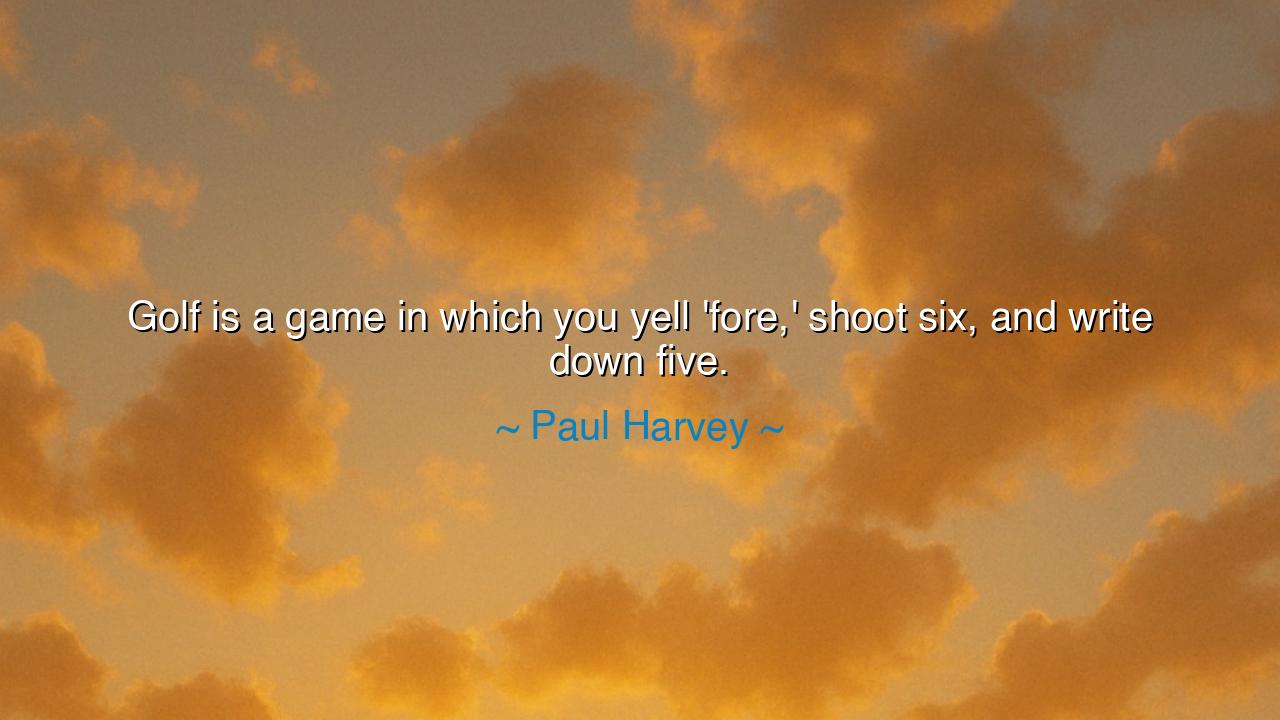
Golf is a game in which you yell 'fore,' shoot six, and write






Hearken, O seeker of wisdom, to the words of Paul Harvey, the storyteller of the American spirit, who wittily observed: “Golf is a game in which you yell 'fore,' shoot six, and write down five.” Beneath the humor lies a profound meditation on the nature of honesty, humility, and the human tendency to soften reality. In this playful remark, Harvey captures not only the quirks of sport but the timeless lessons of self-awareness and moral integrity.
Since the dawn of human contest, mortals have grappled with the tension between aspiration and fallibility. The Greeks, in their games of Olympia, revered virtue as much as victory, emphasizing that honor lies not solely in triumph, but in honesty and the acknowledgment of one’s limits. Harvey’s observation echoes this ancient truth: even as we strive for mastery, the human heart seeks to reconcile imperfection with the dignity of appearance, crafting stories to ease the burden of failure.
Golf, as Harvey portrays it, becomes a mirror of life itself. The player shouts a warning, takes a swing that exceeds expectation, yet records a more flattering account. In this, the game reveals the dual nature of human endeavor: aspiration and self-deception, effort and embellishment, courage and humility. Each stroke embodies the struggle to align reality with desire, illustrating the universal challenge of reconciling action and perception.
Consider the story of Leonardo da Vinci, whose notebooks are filled with experiments, sketches, and failures alongside brilliant insight. He meticulously recorded what he observed, yet often adjusted or reimagined outcomes to suit vision and interpretation. Harvey’s humor reflects this eternal dance between truth and aspiration, reminding us that human efforts, however sincere, are often accompanied by the gentle embellishments of hope and self-interest.
The ancients also recognized the need for honesty in practice. The Roman orators and philosophers extolled the virtue of acknowledging error, of recording deeds faithfully, and of learning from missteps. Harvey’s witticism transforms this lesson into sport: the golfer’s six becomes a five not to deceive others, but to reconcile personal desire with moral awareness, underscoring the importance of integrity and reflection in every pursuit.
Yet the wisdom extends beyond golf. In all endeavors—art, governance, commerce, or scholarship—one must balance ambition with honesty. To confront failure openly, to learn from miscalculation, and to temper aspiration with moral integrity ensures growth and respect. Harvey’s playful observation illuminates this truth: human beings, while tempted to embellish reality, achieve greater honor when they embrace humility and reflection.
The lesson, therefore, is clear: cultivate honesty, acknowledge limitations, and temper ambition with humility. Practical actions follow: record your efforts truthfully, reflect upon mistakes, learn from each misstep, and approach challenges with self-awareness. In doing so, even errors become opportunities for wisdom, and every endeavor is infused with integrity.
Walk forward, O listener, as the golfer approaches the tee, aware of every swing, every miscalculation, and every lesson hidden in failure. Let Harvey’s words echo through your life: golf is a game in which you yell 'fore,' shoot six, and write down five. In this jest lies eternal wisdom: embrace your imperfection, temper effort with honesty, and let humility guide each stroke, each action, and each step along the path of mastery.






AAdministratorAdministrator
Welcome, honored guests. Please leave a comment, we will respond soon